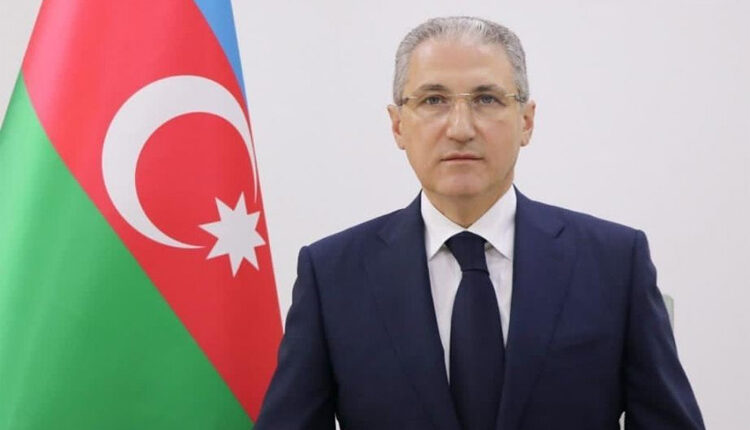Azerbaijan appoint state oil company veteran as Cop29 president
The government of Azerbaijan has appointed its environment minister Mukhtar Babayev to be the president of the Cop29 climate talks in Baku in November.
While Babayev will chair the talks, Azerbaijan’s deputy foreign minister Yalchin Rafiyev will be his lead negotiator, according to the Cop28 presidency.
Babayev spent 26 years at Azerbaijan’s state-owned oil and gas company Socar, where he tried to limit the company’s environmental damage, before becoming environment minister in 2018.
One negotiator who met Babayev recently described him as “nice” and “soft” but added “you don’t feel the authority and status like from [Cop28 president] Sultan [Al-Jaber], I don’t feel he is an independent person able to push for phasing out fossil fuels globally”.
Rafiyev is a newcomer to climate diplomacy. He did not attend the Cop26 or Cop27 climate talks and his active X (formerly known as Twitter) account has only mentioned climate change once in over six years.
Babayev will be the 24th man – and the fourth man in a row – to chair the Cop climate talks compared to only five women.
A Socar veteran
With Azerbaijan’s media severely restricted, there is not much information publicly available about Babayev other than his official ministry biography and leaked US diplomatic cables.
What is known is that he grew up in Baku, went to university in Moscow and served in the Soviet military in the late 1980s.
After Azerbaijan gained independence from the Soviet Union, he joined the newly-named State Oil Company of the Azerbaijan Republic (Socar) in 1992, where he stayed for 26 years.
After a stint in marketing, he was appointed the company’s vice-president of ecological affairs, which involved trying to reverse the environmental damage caused by the company.
In this position, he hosted an international conference on rehabilitating contaminated soils in 2008, where he warned that a drop in the oil price could have a negative impact on the company’s efforts to clean Azerbaijan’s soil.
Around this time, the US ambassador in Baku Anne Derse said he told her that he wanted to change the company’s attitude towards the environment while still developing the country’s oil and gas production.
Derse says Babayev joked to the company’s then vice-president for field development that they were now enemies as he wanted to change the way Socar develops its resources and his colleague wanted to continue business as usual.
“On a broader scale,” Derse said, “Babayev said his mission was to “change the mentality” of Azerbaijanis about their responsibilities to preserve the environment”.
She concluded concluded that he “seems enthusiastic and in possession of a clear vision of what he hopes to accomplish”.
While in this position, Babayev became a member of parliament for the ruling party. In 2018, Azerbaijan’s authoritarian ruler Ilham Aliyev appointed him environment minister.
A new beat
While Cop presidents front the talks, they delegate much of the behind the scenes work to their lead negotiator.
Previous lead negotiators like Archie Young, Mohammed Nasr and Hana Alhashimi have been experienced climate diplomats.
Cop29’s lead negotiator will be 36-year old Yalchin Rafiyev. The United Nations participant logs suggest his first climate meeting was the annual talks in Bonn in June 2023 followed by Cop28 in November.
Joanna Depledge researches climate talks at Cambridge University. She told Climate home that “Rafiyev seems to be a rather unknown quantity”.
She said this will make it harder for him to establish his leadership, good working relationships and trust – particularly as he’s been appointed later than usual, with just 11 months to go.
“But”, she added, “there is still time for the Azerbaijani presidency team to hit the ground running and to plough political energy and resources into the process.”
After an international relations degree from Baku State University, Rafiyev studied at the Nato defence college in Rome and the International Anti-Corruption Academy in Austria.
He joined Azerbaijan’s foreign ministry in 2007 and spent several years in their Austrian embassy before representing the country with the United Nations and other international organisations in Geneva, Switzerland.
Depledge said that “Rafiyev’s extensive experience in the Azerbaijani diplomatic service, including a stint working on UN affairs in Geneva, will serve him well. But he has a lot of catching up to do”.
In 2018, he joined the ministry’s international security department where he stayed until Aliyev appointed him deputy foreign minister in September 2023.
In 2020, Azerbaijan launched a victorious six-week war with Armenia which has led to continuing tensions between the two. Much of his X feed criticises alleged genocide by Armenia.
When Azerbaijan was chosen as the host of Cop29, he posted: “Finally it is official! After World Urban Forum, Azerbaijan was granted the right to host the biggest United Nations event (COP29) in Baku.”
The Eastern European group of nations chose Azerbaijan as Cop29 host at Cop28, after Russia vetoed any European Union member state hosting the talks.
An unexpected choice
E3G negotiations analyst Tom Evans described it as an “unusual and unexpected” choice because Azerbaijan “doesn’t have a long track record of diplomacy at the [UN climate arm]”.
Azerbaijan gets two-thirds of its revenue from oil and gas, one of the highest percentages in the world and more than the Cop28 host – the United Arab Emirates.
The country has been ruled for 20 years by Ilham Aliyev, who took over as president from his father. According to Human Rights Watch, the government had at least 30 political dissidents in its prisons in 2022.
The campaign group said that restrictive laws continued to impede nongovernmental organizations from operating independently and that there are restrictions on media and systemic torture of prisoners.


Comments are closed.